"Herbert Hoover's Tragic Presidency"
Herbert Hoover's Historical Reputation
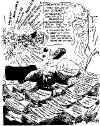 President
Hoover has gone down in history as a totally uncaring chief executive who,
while he presided over economic disaster, cared little about his fellow
citizens, accepted the Great Depression as inevitable and something to
simply be endured regardless of the level of suffering it caused, and who
refused to do absolutely anything to alleviate the incredible suffering
all around him for three and one-half long years. While this image was
particularly widespread during the 1930s and persists even to this day,
it is totally fallacious, misleading, and unjustified.
President
Hoover has gone down in history as a totally uncaring chief executive who,
while he presided over economic disaster, cared little about his fellow
citizens, accepted the Great Depression as inevitable and something to
simply be endured regardless of the level of suffering it caused, and who
refused to do absolutely anything to alleviate the incredible suffering
all around him for three and one-half long years. While this image was
particularly widespread during the 1930s and persists even to this day,
it is totally fallacious, misleading, and unjustified.
A More Balanced Historical Perspective
Herbert Hoover was in the right
place at the wrong time. He could well have been a good - if not great
- president had he served at another time. His ideological beliefs were
such that he could well have launched the country in a more progressive
direction than his predecessors in the 1920s had not the Great Depression
intervened. He was far more committed to active government than either
Calvin Coolidge or Warren Harding. However, as the presiding chief executive
when the Depression began, he has received the blame for the Depression
from his fellow countrymen both at the time and from subsequent generations.
While he really was a "progressive" in his own way and probably did more
to end the Depression than any preceding president in previous economic
collapses, what he did failed to alleviate the situation and therefore
he gained a reputation that was only partially deserved.
The Self-Made Man
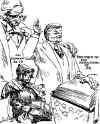 Orphaned
at an early age, Hoover had made a success out of himself - according to
his pre-Depression legend and hype - by dent of his own hard work. Working
his way through Stanford University to a degree in mining engineering,
he went on to found his own business and became a multimillionaire. During
the Great War he served in a voluntary capacity as director of the Food
Administration Board, assigned the task of overseeing the production and
distribution of foodstuffs required for victory. Following World War I,
he headed up a private relief campaign to provide Europeans - literally
facing the prospect of starvation - with food. His efforts were highly
publicized and there was even talk in 1920 of him being the Republican
candidate for president. While Warren Harding would be the nominee of a
brokered convention, Hoover would serve as Secretary of Commerce during
the next eight years. Escaping any involvement in the Teapot Dome scandal
and receiving a great deal of positive publicity - much of it self-generated
- for his supposed role in engineering the economic boom of the 1920s,
Hoover entered the presidency in 1929 with a great deal of ballyhoo. During
the 1928 presidential campaign his political handlers built this reputation
up to phenomenal heights. Thus, when the Depression began and Hoover's
efforts to deal with it were unsuccessful, his fall from grace was that
much more spectacular because the publicity had built expectations up to
a totally unrealistic level.
Orphaned
at an early age, Hoover had made a success out of himself - according to
his pre-Depression legend and hype - by dent of his own hard work. Working
his way through Stanford University to a degree in mining engineering,
he went on to found his own business and became a multimillionaire. During
the Great War he served in a voluntary capacity as director of the Food
Administration Board, assigned the task of overseeing the production and
distribution of foodstuffs required for victory. Following World War I,
he headed up a private relief campaign to provide Europeans - literally
facing the prospect of starvation - with food. His efforts were highly
publicized and there was even talk in 1920 of him being the Republican
candidate for president. While Warren Harding would be the nominee of a
brokered convention, Hoover would serve as Secretary of Commerce during
the next eight years. Escaping any involvement in the Teapot Dome scandal
and receiving a great deal of positive publicity - much of it self-generated
- for his supposed role in engineering the economic boom of the 1920s,
Hoover entered the presidency in 1929 with a great deal of ballyhoo. During
the 1928 presidential campaign his political handlers built this reputation
up to phenomenal heights. Thus, when the Depression began and Hoover's
efforts to deal with it were unsuccessful, his fall from grace was that
much more spectacular because the publicity had built expectations up to
a totally unrealistic level.
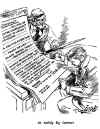 Hoover
himself was apparently aware of the potential problem. As president-elect
in late 1928 he confided his fears in this respect to a confident, William
J. Abbot who was editor of the Christian Science Monitor. He purportedly
said: "My friends have made the American people think me a sort of superman,
able to cope successfully with the most difficult and complicated problems.
They expect the impossible from me and should there arise in the land conditions
with which the political machinery is unable to cope, I will be the one
to suffer".
Hoover
himself was apparently aware of the potential problem. As president-elect
in late 1928 he confided his fears in this respect to a confident, William
J. Abbot who was editor of the Christian Science Monitor. He purportedly
said: "My friends have made the American people think me a sort of superman,
able to cope successfully with the most difficult and complicated problems.
They expect the impossible from me and should there arise in the land conditions
with which the political machinery is unable to cope, I will be the one
to suffer".
Hoover certainly felt by 1932, after
over three years of the worst economic depression the country had ever
known, that his declining approval rating and popularity were the result,
at least in part, of this public image as a superman. He said that he had
been "absolutely oversold". To a Republican senator he said: "No man can
live up to it".
Responding to the Crisis
Despite an undeserved, fallacious,
but enduring reputation as a do-nothing who simply accepted the Depression
as an unpleasant fact of economic life that simply must be endured, President
Hoover did try to end the Great Depression and, in fact, probably
did more to deal with it than any preceding president had ever done in
time of economic catastrophe. Hoover applied a conservative business-oriented
approach that stressed voluntary efforts by Americans rather than governmental
interference in the economy. What he tried was unsuccessful and sometimes
poorly handled and out of this grew his public reputation.
Having taken at least partial credit
for the economic boom of the Twenties when he campaigned for the presidency
in 1928, Hoover had trouble personally accepting the end of the boom or
fathoming just how bad the crash and Depression would be. He, however,
was not alone in this. Hoover initially felt that the Depression was a
temporary aberration in the economic cycle caused more by psychological
fears than economic realities. Therefore, President Hoover responded to
the crash of the stock market and the beginning of the Depression by counseling
confidence....as long as Americans didn't let panic cause them to take
intemperate and unwarranted action, the country would witness a brief and
limited recession and then resume its economic boom. Confidence was the
key.
The President waged a campaign to
convince businessmen to keep wages up so that consumption levels would
not decline. This approach was less than successful. While businessmen
maintained wage levels temporarily, they cut back on the number of their
employees because of dropping consumption levels. Hoover also failed in
his confidence campaign to convince consumers to keep purchasing. Seeing
other workers laid off and fearing for their own future, laborers cut back
on purchases thus guaranteeing further layoffs.
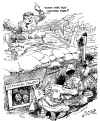 Hoover's
confidence campaign, while well intentioned, simply did not work. The economy
continued its downward spiral - workers cut back on consumption, more workers
were laid off, workers cut back further on consumption, etc., etc.
Hoover's
confidence campaign, while well intentioned, simply did not work. The economy
continued its downward spiral - workers cut back on consumption, more workers
were laid off, workers cut back further on consumption, etc., etc.
In order to understand Hoover's
long-term reaction to and efforts to end the Great Depression, one must
understand Hoover's idea of "Progressivism" - with which he consciously
identified. President Hoover felt that while government intervention in
the private sector was sometimes necessary in the modern industrial era,
such intervention should be kept to an absolute minimum. This philosophy
was a curious cross between the "old" and the "new". As Robert McElvaine
puts it: "What Herbert Hoover was grappling with was one of the fundamental
problems of the twentieth century: how to apply our Jeffersonian heritage
in a highly concentrated, urban industrial setting". "His ideal remained
people ruling themselves, through voluntary cooperation".
President Hoover felt the key to
economic recovery was restoring the confidence of the business community
in the economy of the United States. Only if businessmen reinvested their
capital in the economy would the country be able to recover. Therefore,
he pursued for three plus years a conservative business-oriented approach
to recovery.
A fiscal conservative, he fought
desperately to maintain a balanced federal budget. This was extremely
difficult given the demands placed on the government to launch various
relief programs and a shrinking revenue base because of unprecedented deflation.
Hoover however said: "The course of unbalanced budgets is the road to ruin".
The logic of this position was that the business community would be discouraged
and delay reinvestment if the government were unable to operate in the
black. As McElvaine points out: "The President therefore devoted much of
his energies in 1931 and 1932 to the goal of a balanced budget, which was
hopeless under the circumstances. Yet, as Hoover himself had recognized
in less frantic times, cutting spending and raising taxes diminished purchasing
and made the situation worse".
In the name of restoring business
confidence, President Hoover also rejected ever-louder demands by Americans
that the currency system be inflated. Many Americans reasoned that since
the economic disease the country suffered from was unprecedented deflation
(as hundreds of millions of dollars were withdrawn from circulation and
investment) then the appropriate prescription was inflation. They urged
the government to abandon the gold standard and flood the economy with
printed currency. Hoover rejected such demands arguing that a stable or
"hard" currency system had always been a prerequisite for business investment.
If the currency system was inflated by the government, businessmen would
refuse to reinvest their funds in the economy. This would simply delay
the day when economic recovery could begin. Thus, Hoover refused to give
in to the demands for inflation.
President Hoover was also supportive
of protective tariffs to shield American businessmen from foreign competition.
Tariffs had been used pretty consistently since the end of the Civil War
to encourage industrial investment and development. In 1930 the United
States Congress passed and President Hoover signed into law the Smoot-Hawley
Tariff. Only partially a response to the crash of the stock market and
the beginning of the Depression, this was the highest tariff in American
history, "with ad valorem rates jumping from an already high 33 percent
to more than 40 percent". While Hoover hoped the tariff would help economically,
it worsened the situation. "Other nations quickly retaliated and the world
depression grew worse".
As businesses failed or slashed
production levels, unemployment skyrocketed. As more and more millions
lost their jobs, the unemployed looked to the federal government for relief
of poverty. They demanded that the federal government institute relief
or welfare payments for the needy. President Hoover rejected such demands
for both ideological and financial reasons. He felt relief should be handled
by the private sector - Community Chest, United Way, the Salvation Army,
churches, individual philanthropy, etc. If government had to deal with
this problem, it should be state and local governments - where the programs
would be more democratic, cheaper, and less bureaucratized. Hoover also
refused to the end of his presidency to begin federal relief or welfare
programs because such a program would, he argued, be incredibly expensive,
would unbalance the federal budget requiring deficit financing, and would
cause businessmen to lose confidence thus delaying reinvestment and the
beginning of economic recovery.
Hoover's position overlooked the
fact that the problem of unemployment and the resultant poverty was too
big for the private sector and state and local governments to handle adequately.
By 1932 unemployment had reached 24.9% nationwide. This was so massive
a problem that only the federal government, with its borrowing power and
its ability to print currency, could cope with it. Nonetheless, Hoover
refused to budge.
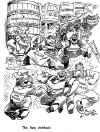 President
Hoover did increase federal spending on public works as a way of trying
to lessen unemployment. $700 million on such projects in 1931 was unprecedentedly
high. However, he grew more hostile with the passage of time believing
"a huge work relief program might be as demoralizing as a dole". When Congress
passed the Emergency Relief and Construction Act in 1932, Hoover's administrators
did everything in their power to limit its impact through the implementation
process.
President
Hoover did increase federal spending on public works as a way of trying
to lessen unemployment. $700 million on such projects in 1931 was unprecedentedly
high. However, he grew more hostile with the passage of time believing
"a huge work relief program might be as demoralizing as a dole". When Congress
passed the Emergency Relief and Construction Act in 1932, Hoover's administrators
did everything in their power to limit its impact through the implementation
process.
Hoover acted boldly in calling for
and obtaining the Reconstruction Finance Corporation - a government lending
agency that made long-term low interest loans to banks and big businesses
in hopes of prompting economic recovery. While RFC loans did forestall
the peaking of the banking crisis until 1933, they failed to promote economic
recovery. As McElvaine points out - "Given the paucity of purchasing power,
businesses were not interested in obtaining loans. Expansion was the last
thing on the minds of most businessmen in 1932". Therefore, businesses
didn't borrow to expand, workers weren't rehired, and thus there was no
increase in consumption by rehired laborers.
While the RFC was an innovative
step, note that it was in line with Hoover's conservative business-oriented
philosophy and approach. The loans went to banks and big businesses not
to the unemployed, homeless, or needy.
Evaluation
Herbert Hoover once told his old
friend Julius Barnes: "No president must ever admit he has been wrong".
During the last two years of his presidency as it became more and more
apparent that the Depression was worsening and his program of confidence,
voluntarism, and business support wasn't working, President Hoover set
his feet in concrete. He refused to recognize that his philosophy and programs
weren't working. Rather than try something different, he clung rigidly
to his program, became more and more defensive, tried to convince himself
and Americans that things were getting better, and lost the support of
the nation. Why?
Partly, it was his personality.
Joan Hoff Wilson, a Hoover biographer, maintains that Hoover was always
unable to admit defeat or failure throughout his entire life. She points
to a business venture launched by Hoover that very clearly failed but that
he always maintained was a success. According to Wilson, Hoover had no
reason to fudge the truth - he was a successful businessman who made millions
and that many business ventures fail. He just couldn't admit defeat or
failure.
He had a great capacity for self-delusion
where failure was involved. Note the denial of reality in these words he
wrote to a friend shortly after leaving office: "This country started out
of the Depression in August 1932.....and all the rest of the principal
commercial countries started out at the same time....all of them have gone
along smoothly making steady progress; [only] the United States slipped
backwards and came into a banking panic because the New Deal began on November
9,1932".
Hooverís refusal to abandon his
business-oriented, small government approach to the Depression was also
the result of the fact that he was an ideologue rather than a pragmatist.
As McElvaine puts it -"It is impossible to understand Herbert Hoover and
his reaction to the Depression without seeing that he was that rarest of
politicians, a man of principle. He was an idealist who firmly (and rightly)
believed that means cannot be separated from ends. This was admirable up
to a point. But his method proved disastrous during the Great Depression
when crisis conditions demanded results without much concern about method".
Hooverís reputation, in many ways,
grew out of his intransigence. Despite every indication that his approach
to ending the Depression was not succeeding, he tenaciously continued down
the path he had trod since the stock market crash in 1929. However, the
presidentís genuine efforts to engineer recovery were and are largely overlooked
because he suffered from an ever-deepening image problem. While he counseled
optimism, his rigid and dour personality imparted a sense of gloom and
despair. He also failed to use the media effectively to communicate with
the populace and he seemed isolated from his fellow citizens and the real
world. At the depth of the national catastrophe in 1932, two incidents
forever fixed Hooverís public image. In the summer of that year, Movietone
News crews filmed the president feeding his dog T-bone steak in the Rose
Garden at the White House. This footage played over and over again in movie
theaters across the country and was disastrous for a chief executive up
for reelection who claimed that federal relief would destroy the American
character. On top of this came the governmentís treatment of the Bonus
Army. General Douglas MacArthur violated a direct presidential directive
from Hoover not to attack the veterans of the Great War encamped at Anacostia
Flats in the nations capital. Hoover, however, took the blame for this
public relations nightmare.
In the seventy years since his administration
ended in failure, Hooverís ratings and reputation have improved little.
In part this was because he was the incumbent when disaster struck. Like
all incumbents, his reputation was in many ways simply a reflection of
events. Incumbents get the credit when things go well, whether they had
anything to do with it or not. Conversely, incumbents get the blame when
things go bad whether or not they were truly responsible. Hooverís historical
reputation, however, has remained so fixed because he suffered from the
extreme contrast in personality with his successor, Franklin D. Roosevelt.
Hoover seemed so much more of a failure because Roosevelt convinced millions
of Americans that things were getting better once he assumed office and
launched the New Deal program. Finally, the Democratic party ran against
Hoover for a half century. At election time, every Republican candidate
was likened to Herbert Hoover. It was an effective partisan technique for
attracting votes but it converted the "forgotten progressive" into a caricature
of his true self.
___________________________________________________________________________________
All quotations unless otherwise
noted are from Robert S. McElvaine, The Great Depression: America, 1929-1941,
Time Books (New York, 1984).
Suggested Readings:
David Burner, Herbert Hoover:
A Public Life , Knopf (New York, 1979).
Martin I Fausold, The Presidency
of Herbert Hoover, University Press of Kansas (Lawrence, Kan., 1985).
Herbert Hoover, The Memoirs of
Herbert Hoover: The Great Depression, 1929-1941, Macmillan (New York,
1952).
Gene Smith, The Shattered Dream:
Herbert Hoover and the Great Depression, William Morrow & Company
(New York, 1970).
Harris Gaylord Warren, Herbert
Hoover and the Great Depression, Norton Library (New York, 1967).
Joan Hoff Wilson, Herbert Hoover:
Forgotten Progressive, Little, Brown, and Company (Boston, 1975).
© L. Patrick Hughes, 1999

 President
Hoover has gone down in history as a totally uncaring chief executive who,
while he presided over economic disaster, cared little about his fellow
citizens, accepted the Great Depression as inevitable and something to
simply be endured regardless of the level of suffering it caused, and who
refused to do absolutely anything to alleviate the incredible suffering
all around him for three and one-half long years. While this image was
particularly widespread during the 1930s and persists even to this day,
it is totally fallacious, misleading, and unjustified.
President
Hoover has gone down in history as a totally uncaring chief executive who,
while he presided over economic disaster, cared little about his fellow
citizens, accepted the Great Depression as inevitable and something to
simply be endured regardless of the level of suffering it caused, and who
refused to do absolutely anything to alleviate the incredible suffering
all around him for three and one-half long years. While this image was
particularly widespread during the 1930s and persists even to this day,
it is totally fallacious, misleading, and unjustified.



